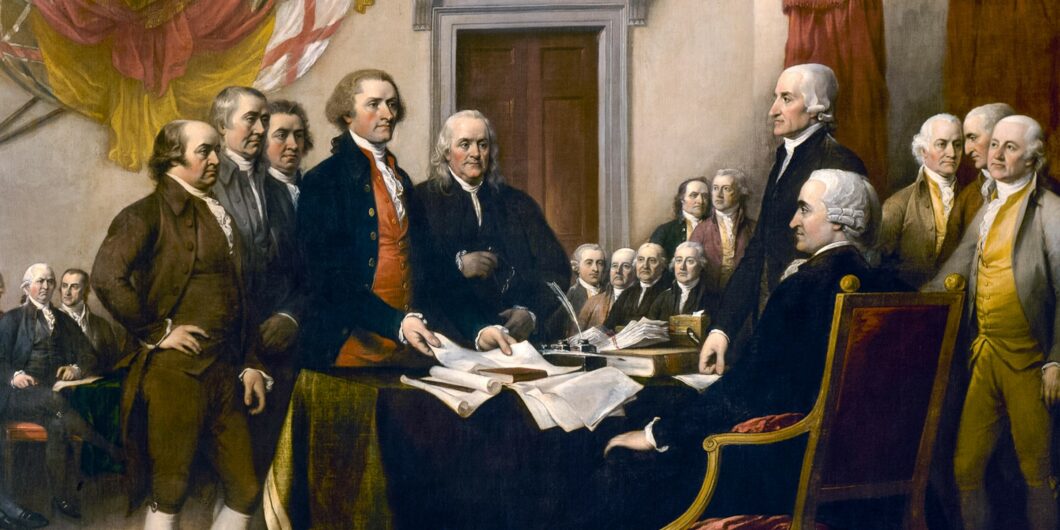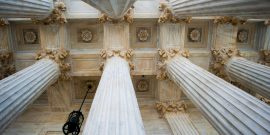These are the Hamilton texts to read to master the foundations of America’s economic success story.
250 Years of Jeffersonian Constitutionalism
Thomas Jefferson’s Summary View of the Rights of British America, composed sometime in the latter half of this month, 250 years ago, ought to be regarded as among the most fundamental primary sources informing our understanding of the spirit and history of the American constitutional tradition, but it is rarely considered in this way. Rather, it has served mainly as a backdrop to its more famous linear offspring, the Declaration of Independence.
Scholars have analyzed the Summary View for what it says about natural law, natural rights, or the radical tone of its address. They have looked to its list of grievances for what that list reveals about the charges that made it into Congress’ formal statement of separation two years later. They have even looked to it to explain those grievances that were omitted from the original draft of the Declaration emanating largely from Jefferson’s pen.
For these and other reasons, Summary View can hardly be said to have been neglected. Still, it would not be wrong to point out that its most important aspects have rarely been appreciated or understood since Jefferson issued it in 1774. In fact, most treatments have regarded the document as composed of dubious exaggerations and fanciful assertions about local colonial self-government, the limits of parliamentary rule, and, more particularly, the nature of the king’s executive powers.
In a recent biography of George III, we are presented with the more traditional view of Jefferson’s claims. “American radicals,” we are told, “were proposing ways for the King to govern America without recourse to Parliament from which even the Tories shrank at home.” As it turns out, this long-held assertion needs to be significantly amended.
A great many Englishmen did in fact know exactly what Jefferson and the Americans were driving at and a great many more of them than was once believed, readily approved Jefferson’s constitutional understanding. It is exactly on these points concerning the decentralized nature of the empire, the need for a stricter delineation of the responsibilities of government, and the hope to carefully check and balance the powers of those offices that Summary View is most revealing and, I would argue, most important for understanding the American constitutional tradition.
Tone and Substance
Usually, histories dealing with Summary View note that it was, until the appearance of Thomas Paine’s Common Sense in January of 1776, the most radical statement of the American cause. Falling just short of calling for separation, Jefferson made a direct and insistent address to “his majesty,” stepping over a line that most writers until that moment had taken care not to cross. Jefferson hoped to divest his remarks of all “expressions of servility,” so as not to be mistaken for asking for favors rather than rights.
But this was to be radical in tone only. Jefferson’s view in the document was in reality simply a fuller exposition of the constitutionalism that had been developing over the long course of English history going all the way back to the incorporation of the early kingdoms of Wales, Scotland, and Ireland.
Today it is too easy to dismiss Jefferson’s arguments. The usual interpretation contends that any effort to separate the king from the control of Parliament ran against the entire force of British political thought. Parliament was never going to permit the king any kind of separate jurisdiction from its own power and Englishmen of the late eighteenth century are usually said to have been incapable of fathoming the American cause. But that is to prejudice one’s reading with the present day’s infatuation with the unitary nation-state.
As it turns out, plenty of Englishmen were quite used to dealing with separate and semi-independent realms. And a good many more wanted to keep it that way. The empire was in reality, highly decentralized, even, polycentric, and that reality is what shaped Jefferson’s constitutionalism. A quick review of the pamphlets on both sides of the Atlantic, not just the American, reveals how deep the controversy ran throughout the English-speaking world.
The Pamphlet Debates
The consensus was certainly not about Parliament’s sovereignty and certainly not its supremacy in any simple sort of way. As one anonymous writer in London observed over the Stamp Act, “Whatever Boundary there may be to the power of Parliament, it is not easily defined, the law relative thereto being extremely abstruse according to an expression of Lord Coke, Paucis cognita.” And many others thought precisely along these lines.
A common theme of writers at this time was to repair to the earliest examples of dominions acquired through conquest. Wales and Ireland were repeatedly raised as counterfoils to the claim of the imperial ministry that all power had to be under Parliament once the king’s authority was joined with Lords and Commons.
Among the earliest writers to grapple with the ambiguities of the imperial order was James Otis in The Rights of the British Colonies Asserted and Proved. That pamphlet proved to be something of a bestseller and was widely reprinted throughout England. Contending against the imposition of the Stamp Act, Otis first raised the examples of Ireland and Wales. “I cannot,” he observed, “find any instance of a tax laid by the English Parliament on Ireland.” And if any dominion was to be taxed against its consent, he argued, surely it would be one that had been conquered.
“None doubted that Ireland was as much conquered as [Wales],” he noted, but in the former, they were allowed to have their own Parliament, while in the latter they were permitted to join with Parliament and send their own members well before any taxes were imposed. These points led Otis to the logical question, “Why … should they [the colonies] not be entitled to their assemblies, or parliaments, at least as well as a conquered dominion?”
That reasoning was repeated by the elder William Pitt in the House of Lords when he moved for the repeal of the Stamp Act in 1766. The idea that some parts of England were only “virtually represented” was without foundation, he argued, because in England subjects “are represented in other capacities, as owners of land, or as freemen of boroughs,” but none of this could apply to the Americans.
In an earlier age, Pitt observed, “Even under former arbitrary reigns, Parliaments were ashamed of taxing a people without their consent.” Why, he asked, did the defenders of the act only refer to the cities of “Chester and Durham?” A “higher example” was to be found in Wales: “Wales, that never was taxed by Parliament till it was incorporated!”
What makes Otis’ Irish example particularly interesting is that it undermines much of the belief in the definitive nature of the Declaratory Act issued at the very same time as the repeal. Both Pitt and that rising star of English statesmanship, Edmund Burke, helped broker the deal that made repeal possible. For many historians, that seems incontrovertible evidence for the belief in the supremacy of Parliament, but they forget that in 1720, England had also passed such an act regarding Ireland.
Jefferson’s Summary View was not only reflective of a more plausible appraisal of an older imperial constitutional order, but it was also the harbinger of a new one.
Declaratory Acts never could, as Otis remarked, amount to anything more than a truism. Any assertion of absolutism was on its face a “contradiction in terms,” if by absolute was meant anything not already understood to be legal, or within the purview of law. Put most simply, “Parliament cannot make 2 and 2, 5; Omnipotency cannot do it.” If the act in question later proved contrary to “truth, equity, and justice,” he concluded, it would as a consequence be “void, and so it would be adjudged by the parliament itself, when convinced of their mistake.” The Declaratory Act of 1766 was simply a way for those who opposed repeal to save face, but as Burke and Pitt well knew, it by no means settled the dispute with the colonies.
These points about the ambiguity and indeterminacy of Parliament’s authority with respect to the other constituent members of the empire were carried forward in the later controversies over the Townshend duties and the tax on tea. One such writer was the second Baron Lord Rokeby, who put the matter very forcibly in a London pamphlet that preceded Summary View by just two months:
How many points of this sort are undetermined between Great Britain and Ireland, which are now to our mutual happiness entirely dormant, but which started and pursued with obstinacy and eagerness might make one or both of the islands run with blood … if peace and harmony are then so beneficial and desirable between Great Britain and Ireland and the measures producing or insuring them good, upright and wise; why do these things so alter their nature, when they are applied to America?
Rokeby’s conclusions merit closer consideration for those too eager to embrace the state building of Grenville, Whately, or Charles Townshend as emblematic of their time. As Rokeby also noted, “it often happens, that representatives and their Constituents are in the most essential and the most important points directly and diametrically opposite to one another.” Historians need to take this point more seriously.
Reevaluating the Constitutionalism of A Summary View
In this much more fluid and dynamic atmosphere then, Jefferson’s Summary View takes on greater resonance as a fundamental source document, elucidating an alternative view of the imperial constitutional order to the one that has generally dominated historical interpretation.
That the king could and even should have had separate and direct relationships with the other constituent assemblies of the empire was in fact, very conceivable, and not merely a play on words. In Summary View, Jefferson drew out the implications of that understanding.
Through the governors of the various American colonies, the king was mediately represented. In their capacity as the chief executive officer, each governor exercised his responsibility on behalf of the king. And as the king’s proxies, Jefferson contended, the governors stood in exactly the same relation to the colonial assemblies as George III did to the Parliament of England. Unlike the king, however, who had long refrained from vetoing acts of Lords and Commons, colonial governors frequently, and often by the king’s direct orders, vetoed colonial legislation.
By itself, such interdictions were perfectly constitutional and in line with the proper role of the executive power when checking the legislative from committing any wrongful act or breach of its due authority. What was egregious, however, was that this same power was never exercised by the king against Parliament when it overleaped its due authority as circumscribed by its proper jurisdiction. This was to become one of the major complaints in the Declaration two years later.
Nevertheless, Jefferson pointed out, the power to do likewise with Parliament still existed in theory, in the office of the king. It was only resting dormant because his predecessors had become “conscious of the impropriety of opposing their single opinion to the United wisdom of two Houses of Parliament.” This made sense “while their proceedings were unbiased by interested principle,” but “by a change of circumstances, other principles than those of justice simply have obtained an influence.”
Now was the time for that power to be resumed: “It is now, therefore, the great office of His Majesty, to resume the exercise of his negative power, and to prevent the passage of laws by any one legislature of the empire, which might bear injuriously on the rights and interests of another.”
From here, Jefferson went on to list the many grievances imposed by this foreign legislature on the rights and interests of these other bodies, many of which would come to find their way into the 13th grievance of the Declaration, in which the king was charged with combining “with others to subject us to a jurisdiction foreign to our constitution, and unacknowledged by our laws, giving his assent to their acts of pretended Legislation.”
But in 1774, the king still possessed legitimate executive authority: “He [the king] possess[es],” Jefferson explained, “the executive power of the laws in every state.” But, “they are the laws of the particular state which he is to administer within that state, and not those of anyone within the limits of another.” Rather than “sacrificing the rights of one part of the empire to the inordinate desires of another,” the king’s responsibility was to “deal out to all equal and impartial right.”
Here then was the end of the executive authority properly spelled out. His responsibility was not simply to be the king in Parliament, but the king in every colonial assembly. As such, he was to “Let no act be passed by any one legislature which may infringe on the rights and liberties of another. This is the important post in which fortune has placed you, holding the balance of a great if well poised empire.”
Such a well-poised empire was not to be, but the idea of it would become a powerful current informing Jefferson’s thoughts on a proper constitutional order for Virginia, as presented in his draft proposal for the state in 1776. From here it would find its way into his extended critique of the actual Virginia constitution in Notes on the State of Virginia (1785), where he advocated what he called a constitution founded not only on “free principles,” but one in which “the powers of government should be so divided among several bodies of magistracy, as that no one could transcend their legal limits, without being effectually checked and restrained by the others.”
Madison would run with this insight at the end of the decade in Federalist essays #48 and #49 and from there he would develop the fuller theory of the “compound republic.” In this way, Summary View was not only reflective of a more plausible appraisal of an older imperial constitutional order, but it was also the harbinger of a new one.


